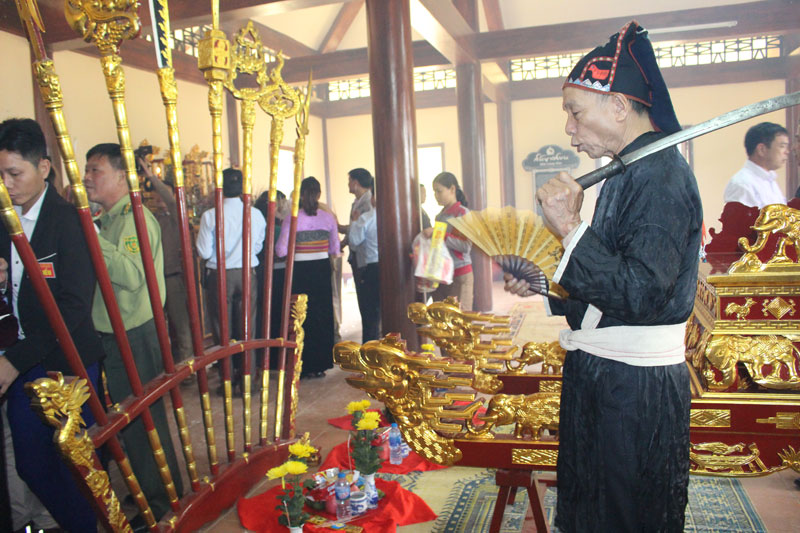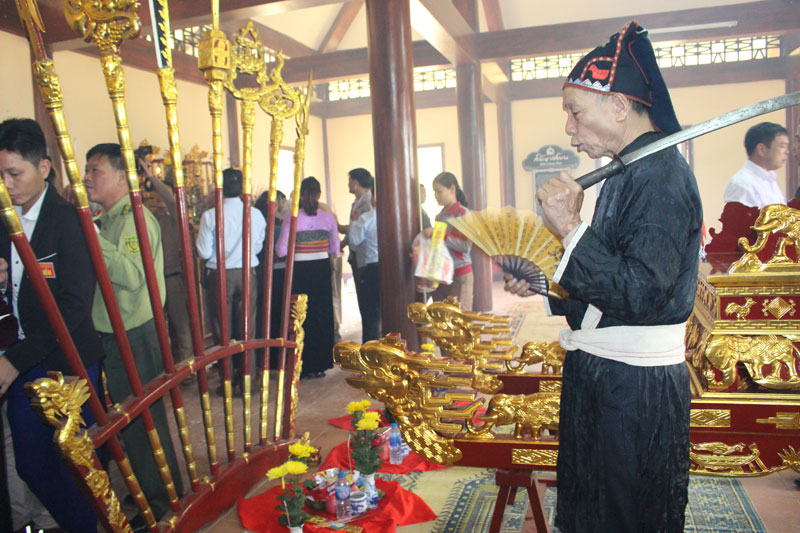
HBO – The Xen Muong festival of the Thai ethnic group is held in early Spring to pray for good harvest, luck and safety. The festival is an occasion to introduce the original cultural values of the Thai to visitors, and also a place for young people to show off their talents in singing and Khen (panpipe) playing.

A shaman performs a ritual at the Bon Village temple during
the Xen Muong festival
Visitors to the festival
will have the chance to listen to the recital of an epic on the local Thai
ethnic group’s history from the early days they set up the villages. It is said
that Chieng Chau was the first place of settlement of the Thai group when they
migrated from Bac Ha (Lao Cai) in the 13th century. Through many ups
and downs, generations of Thai landlords deserved credit for leading locals in
reclaiming forest lands to set up villages. During the Later Le Dynasty, the
Thai landlord in Mai Chau made a great feat in fighting invaders from the
north, and was rewarded with the title "Tuoc hau dai tu khau truc trung hau”
(called in short Tuong Su by the Thai locals).
The Xen Muong festival
highlights the traditional cultural values of the Thai group. It begins with
rituals performed by a shaman, who must be a person respected by all in the
community. On the main stage, the shaman reads prayers in Thai language. He
then leads a procession taking the Tuong Su’s palanquin to the temple of Bon
village, followed by other worshipping rituals. The prayers reflect the adoration
and respect for Thai landlords who contributed greatly to the foundation of
Thai villages. The shaman serves as a bridge between generations of Thai people
with their ancestors.
The vitality of the Xen
Muong festival also comes from the originality of Thai culture and folk dances
and songs./.
A diverse chain of eco-tourism and resort destinations concentrated in Hoa Binh city and the districts of Tan Lac, Da Bac, and Luong Son… Along with the launch of several key high-quality resort tourism projects, these developments have reshaped the landscape and enhanced the appeal of Hoa Binh as a travel destination.
Boasting diverse terrain, a mild climate, and rich natural resources, Cao Phong district is increasingly asserting its place on Vietnam’s tourism map, attracting both domestic and foreign visitors. The district is renowned for its stunning landscapes, majestic mountains, a crystal-clear hydropower lake, and the unique cultural identity of local ethnic groups.
With its pristine landscapes, unique cultural heritage of Muong ethnic minority, and an expanding range of visitor experiences, Tan Lac district of Hoa Binh has fast become a captivating destination for both domestic and international tourists.
Until now, Sung village in Cao Son commune, Da Bac district remains the only Dao ethnic community in Hoa Binh province to develop a community-based tourism model. Beyond its untouched natural landscapes, cultural identity serves as the cornerstone attraction for visitors.
Alongside the diverse cultural identities of the Kinh, Muong, Tay, Thai, Dao, and Mong ethnic people, Hoa Binh province is also renowned as the "capital" of the northwestern Vietnamese cuisine, offering unique and distinctive dishes. At festivals, during Lunar New Year (Tet), or on significant family or community occasions, special dishes are prepared, leaving a lasting impression on visitors.
A Phong Linh (Yellow Tabebuia) flower garden in Thang village, Thach Yen commune, Cao Phong district is currently in full bloom, drawing a large number of visitors.



